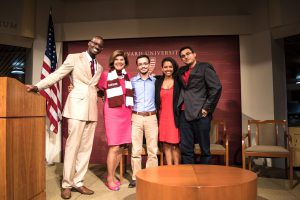By Ivan Rahman, MPP 2018
On September 13th, over 100 students packed the JFK Jr. Forum. Okendo Lewis-Gayle, HKS Election Chair, stood tall, in a beige suit behind the podium. He commenced the Kennedy School Student Government (KSSG) election session of 2016. With a radiant smile, he began the night by introducing the candidates competing to serve as representatives of each class. After introducing these candidates, he turned our attention to the Vice Presidential candidates. Of the VP positions, the most hotly contested seat was VP of International Student Affairs, with four candidates in the running.
As for the top seats, Lavan Gopaul and Jennifer Smith ran for Executive Vice President. Smith, who won, told the audience that she aspires “to work with all of HKS’s students so that we can have the career and impact that we want.” Finally, the three candidates for President introduced themselves and their respective platform. Following their introductions was the most anticipated part of the night: the presidential debate. Ann Compton moderated the 2016 KSSG presidential debate. As a reporter for ABC News, she covered every U.S. president since 1976. Moreover, she believes that “every election matters and every vote matters.” With a firm tone, Compton posed the first question to the Presidential candidates: “What is it about you that makes it possible for you to make quick and wise decisions on behalf of others?”
Each Presidential candidate shared his or her vision for HKS. Adil Islam, for instance, conveyed that he sought to institute a more effective bidding process for HKS courses. David Natarén Oyuela spoke about creating a stronger connection among the myriad of resources at HKS and across the university. Lastly, Arohi Sharma expressed her desire to raise HKS’s visibility. She expressed that “the HKS student body should be celebrated.” In short, she wants the world to know that HKS delivers leaders today who will solve the problems of tomorrow.
Two common themes that arose as students posed questions to the Presidential candidates were tribalism and the lack of space at HKS. With regard to tribalism, students wanted to know how the candidates would bridge differences among the “tribes” that emerge at HKS. After all, there are five degree programs, numerous joint and concurrent degree programs, and multiple cohorts within each program. One candidate proposed that we arrange more informal social gatherings in the Forum itself.
Afterwards, another audience member asked if we could have more lockers. This question unveiled an elephant in the room. There is a great need for more space at HKS while construction and campus expansion proceed.
As the night drew to a close, Ann Compton reemphasized that this country needs every one of us—with our heart and soul—to take part in the democratic process. The stakes are simply too high for us not to engage. In her own words, “Politics is, quite simply, the fascinating story of people. How they live together in society. How some lead, others follow. How people agree, and disagree. It is true for the election of mayors in small American towns, for the election of a U.S. president, and for the student body at the Harvard Kennedy School. What so impressed me about this year’s election debate at the Kennedy School was the amazing diversity of the candidates; yet each and every candidate had at the heart of the argument the same goal: a strong, vibrant, responsive student government. That focus is a rare and precious quality, and I applaud the engagement of each student.”
Finally, I met with Okendo Lewis-Gayle, the emcee for the night, a few days after the debate to hear his thoughts on the KSSG election process. He shared the following with me: “One big highlight in chairing the process was to witness the tremendous desire, among students, to serve the HKS community. I was concerned that there would not be too many candidates. But almost all the positions were contested. The biggest drawback of the process, however, was that the by-laws leave a lot of room for interpretation. On the one hand, you have the needs and rights of the electorate, who are interested in having as many candidates as possible. On the other hand, you have the needs and rights of the candidates. The candidates, as much as possible, would like to have a clear and manageable set of people running. So there was a tension between the needs of the electorate and those of the candidates. And managing that tension can be tricky.”
The HKS election season is now over and winners have been announced. We are reminded of the backdrop against which the KSSG election transpired: the U.S. presidential race. No matter how the U.S. presidential election unfolds, one thing is for sure: In these trying times, we need the principled leaders that HKS produces to remain deeply involved in the civic process. After all, to echo Ann Compton, there is simply too much at stake for us not to take our engagement to the next level.
Photo credit: Hiram J. Ríos Hernández

